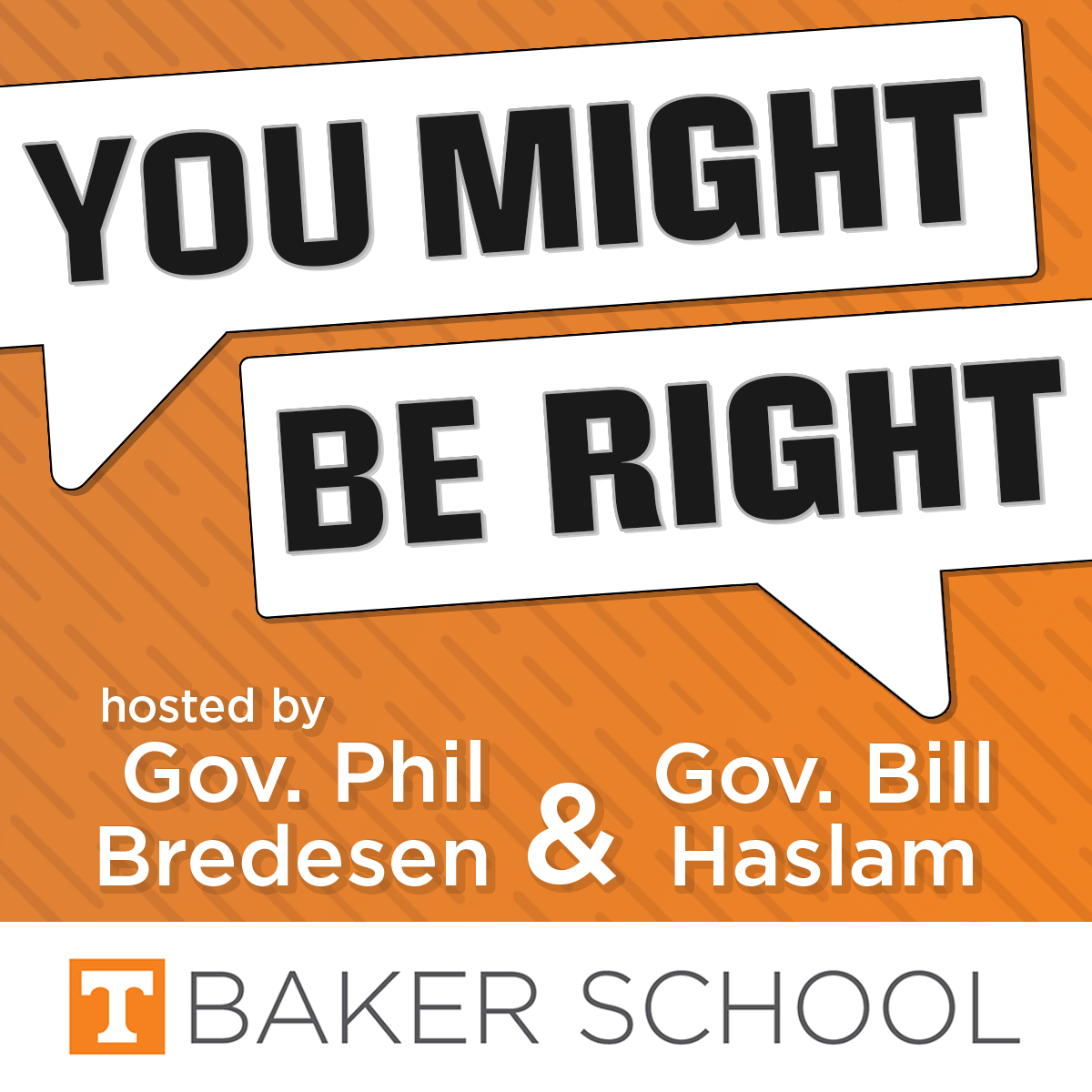If the economy is up, why do Americans feel down?
Despite data underscoring recent economic prosperity for household net worths, real incomes, and economic growth, Americans are feeling overwhelmingly frustrated with the state of the economy. Former Tennessee Governors Bill Haslam and Phil Bredesen take a look at what is driving this economic malaise and possible reforms policymakers can implement to meet the economic demands with three guests– Whit Ayres, founder and president of North Star Opinion Research, John Lettieri, CEO and co-founder of the Economic Innovation Group, and Dr. Mariane Wanamaker, Dean of the Howard Baker School of Public Policy and Public Affairs at the University of Tennessee.
This episode was recorded in front of a live audience at the Nashville offices of Bass, Berry & Sims in partnership with Tennessee think tanks the Beacon Center, the Sycamore Institute, and Think Tennessee.
Subscribe and follow You Might be Right wherever you get your audio content – including Apple Podcasts and Spotify – to never miss an episode, or sign up for our email list to receive new episodes straight to your inbox each week here.
“We need to realize that the vast majority of Americans are feeling really, really anxious right now.”
Whit Ayres, political consultant and pollster advisor for his company North Star Opinion Research, began the discussion by synthesizing American’s economic feelings into one word: anxious.
Ayres offered his perspective regarding the reasons behind the economic frustration that many Americans are experiencing today, citing inflation as a main contributing factor.
“A basket of groceries in 2019 that costs a hundred dollars, costs $125 in 2024, which is one of the reasons Donald Trump was elected,” he said.
But do American’s negative sentiments towards the economy align with reality? Ayres argued that economic perception significantly lags behind macroeconomic data. He explained the frustration many Americans are feeling could be a result of this delay instead of the actual economic reality.
Nevertheless, Americans continue to worry about what is possible in today’s economy and how that has changed over time.
“There is a great sense that what our parents could do is not what our kids can do now, and there’s a diminishing number of people who still believe the American dream is possible,” said Ayres.
“They judged it based on the cost of living.”
John Lettieri, president, CEO and co-founder of the Economic Innovation Group, added to the conversation, sharing his findings that workers are most concerned with the current cost of living.
“We learned something very important during the Biden administration about how Americans rate the health of the economy,” commented Lettieri. “Because, by many conventional measures, the economy was quite strong once we got past the initial shock of COVID. You had strong hiring, strong GDP growth, stock market was doing well for much of that time. But how did Americans judge the health of the economy? They judged it based on cost of living. That was the factor that trumped everything else.”
However, Lettieri explained that America has the resources necessary to relieve some of the economic grievances citizens have. He argued that policy reform can be made possible through innovation.
Looking to the future, Lettieri said, “If you want innovation, you want the smartest people you can possibly throw to a problem, we have that problem solved if we want to. And so, I think a lot of how we should test public policy makers is, what do they do with that ingredient? What is their solution for how to put that ingredient to work?”
“What country do we live in?”
The conversation shifted as Dr. Marianne Wanamaker, former Chief Domestic Economist for the White House Council of Economic Advisors and current dean of the Howard Baker School of Public Policy and Public Affairs at the University of Tennessee, shared a personal story about grocery prices.
“And so, the example I give is, I was on a boat last summer with my family and I had asked my husband to go to the grocery store on the way and grab some snacks,” Wanamaker recalled. “And he happened to grab a bag of chips where the price is still printed on the front of the chip bag, and it said $7.49. And I was unhappy for an hour and a half of the boat ride because the bag of chips cost $7.49. And what country do we live in?”
After diving deeper into the specific issues of housing and grocery prices, real wages, and daycare, Wanamaker concluded that policy reform can only occur when Americans begin to embrace change.
“I think we’ve not been honest with people about where growth comes from. How do you make more income next year than you made this year? And the way you do that is by participating in a knowledge economy in an economy that is growing, that is at the forefront of the technology frontier,” said Wanamaker.
“How do we get more people in government like Phil Bredesen and Bill Haslam and Howard Baker?”
Further conversation on policy reform emphasized the need to get more Americans involved in primary elections and prioritize competitive technological and business growth in communities.
The episode wrapped up by looking at the importance of electing the most suitable candidates, in order to relieve the economic malaise Americans are feeling.
“How do we get more people in government like Phil Bredesen and Bill Haslam and Howard Baker,” Whit Ayers questioned. “We have you, or people who ran for governor, to solve problems and to make life better for Tennesseans. We have people now that frequently want to get elected so that they can get famous and go on TV and make a name for themselves. And that’s a problem because they have little interest in wrestling with the kinds of questions that we’ve been wrestling with during this session here.”
For instance, people need policymakers to address housing prices, one of the biggest contributors to American’s recent economic frustrations, a topic covered in season one of You Might Be Right (listen here).
Explaining that housing reform is very possible, John Lettieri explained, “Builders know how to build homes; buyers know how to buy a home. What’s getting in the way today that wasn’t true 30 or 40 years ago. It’s because we’ve layered in all kinds of barriers to building the kind of housing people want and need in the places where they want to live. And so, you see the sentiment moving more and more towards, I don’t care how you do it, just bring these costs down, get more supply and bring costs down. And there’s a lot of mechanisms available not just to federal policymakers, but to state and local policymakers to do that.”
In the end, all three guests agreed that policy reform for issues like housing and cost of living starts with policymakers pioneering and creating.
“People are afraid of the wrong thing. And for workers, the thing to be feared is an economy that is not changing enough, that is not competitive enough, that is not dynamic enough, not one that’s too dynamic, or too change-forward, or too innovative. And so again, the stories we tell ourselves shape people’s perceptions, and then that shapes their expectations for the future and what their ambitions are. I think if anything, getting to your question, we’ve become way too safe and not ambitious enough as a country about what we can still achieve,” said John Lettieri.
Join the conversation on Twitter by following @UTBakerSchool, @PhilBredesen, and @BillHaslam.
Subscribe and follow You Might be Right wherever you get your audio content – including Apple Podcasts and Spotify – to never miss an episode, or sign up for our email list to receive new episodes straight to your inbox each week here.



